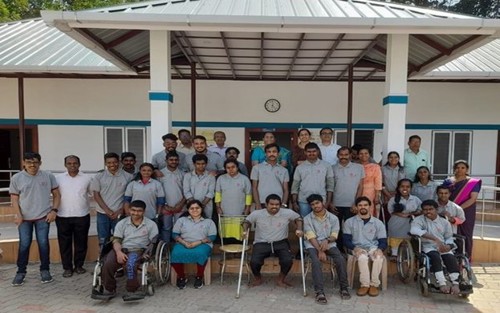About Muskaan
Diversity, not disability. Growth, not neglect.
Muskaan has gained widespread recognition for its groundbreaking efforts in providing vocational training and creating employment opportunities for adults with intellectual disabilities. Their innovative approach has been acknowledged as an effective rehabilitation model, receiving acclaim both nationally and internationally. Muskaan has welcomed parents and professionals from organisations worldwide, including Europe, the USA, Canada, Australia, Mauritius, China, Japan, Singapore, and Afghanistan, who have visited our facilities in recent years and expressed appreciation for our diverse programs.
Through Muskaan’s experience of working with adults, they have been inspired by their student’s growth and resilience when given proper opportunities. Muskaan have witnessed firsthand how students can acquire various skills, become more self-reliant, and lead productive lives. It is not their disability that limits them, but rather the lack of adequate training that hinders their progress and subjects them to a life of deprivation and despair.
 Muskaan's story is one of collective determination, unwavering optimism, and an unwavering commitment to their mission. In 1982, a group of parents and professionals recognized the need for services and facilities catering to individuals with intellectual disabilities and their families. Initially, Muskaan was a loosely connected network, with uncertainties about the path ahead. However, through continuous learning, course corrections, and the accumulation of experience, Muskaan has steadily carved its path forward.
Muskaan's story is one of collective determination, unwavering optimism, and an unwavering commitment to their mission. In 1982, a group of parents and professionals recognized the need for services and facilities catering to individuals with intellectual disabilities and their families. Initially, Muskaan was a loosely connected network, with uncertainties about the path ahead. However, through continuous learning, course corrections, and the accumulation of experience, Muskaan has steadily carved its path forward.
In 1989, Muskaan launched an adult training and employment program, which has earned widespread acclaim for its uniqueness and quality. It all began with three students and one teacher in a garage in Kalkaji, New Delhi. Today, Muskaan stands as the result of a remarkable journey fueled by determination and passion, inspired by spirited and committed individuals, including their students who have always remained the focal point of our work. The development of all projects and programs at Muskaan has been guided by new ideas, research, and experimentation.
The name "Muskaan" means "smile," and their campus is filled with smiles. Smiles radiate from the faces of their students and workers, trainers and supervisors, as well as parents, reflecting the positive impact and uplifting environment fostered by Muskaan.
Read the full History and Vision of Muskaan
Visit the Muskaan Paepid website



 Muskaan's story is one of collective determination, unwavering optimism, and an unwavering commitment to their mission. In 1982, a group of parents and professionals recognized the need for services and facilities catering to individuals with intellectual disabilities and their families. Initially, Muskaan was a loosely connected network, with uncertainties about the path ahead. However, through continuous learning, course corrections, and the accumulation of experience, Muskaan has steadily carved its path forward.
Muskaan's story is one of collective determination, unwavering optimism, and an unwavering commitment to their mission. In 1982, a group of parents and professionals recognized the need for services and facilities catering to individuals with intellectual disabilities and their families. Initially, Muskaan was a loosely connected network, with uncertainties about the path ahead. However, through continuous learning, course corrections, and the accumulation of experience, Muskaan has steadily carved its path forward. The MSDE-UKIERI Skills Thematic Institutional Partnerships Empowerment through Knowledge: A Programme for Social Justice, spanning from February 2018 to February 2021, brought together various partners to champion an important cause. As part of this initiative, the Skill Council took on a leading role in collaboration with Glasgow Kelvin College.
The MSDE-UKIERI Skills Thematic Institutional Partnerships Empowerment through Knowledge: A Programme for Social Justice, spanning from February 2018 to February 2021, brought together various partners to champion an important cause. As part of this initiative, the Skill Council took on a leading role in collaboration with Glasgow Kelvin College.